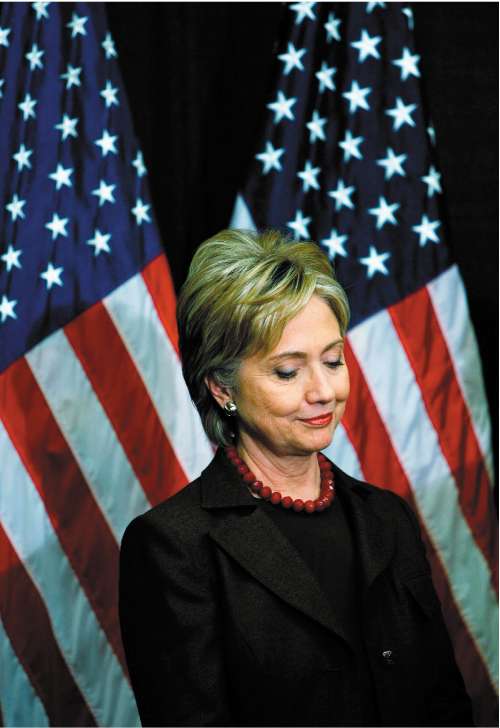The moment of truth for Clinton as must-win states go to the polls

The last time Bonnie Lee Haner voted in an election as significant as today's showdown between Hillary Clinton and Barack Obama was 60 years ago, when Lyndon Johnson, the future president, lied, cheated and ultimately stole his way to a seat in the US Senate.
It's been that long since the Texas Democratic Party, a distinctly unhappy organisation in recent decades, enjoyed a place in the national spotlight. Ms Haner, now 94, has seen it all – as a member of a politically connected family directly caught up in Johnson's notorious act of vote theft, as an election clerk for five decades in the south Texas town of Alice – where Johnson stole his crucial last 200 votes, from the very ballot box where she voted – and, now, as an ardent Clinton supporter.
"In 1948, I was scared to tell them how I voted," she said – "them" being a local political machine run by a charismatic crook called George Parr. She voted for Johnson but she also witnessed a local election observer being manhandled out of her precinct and tossed into jail because he suspected the ballots were being manipulated.
While many things have changed in Ms Haner's part of Texas since 1948 – racial segregation, poll taxes and a near-feudal attitude by the local white elite towards the impoverished Mexican majority are all relics of the past – some others have not.
Politics in Alice is still marked by corruption and bitter infighting. Local people working as consultants to one candidate or another still offer money or services to voters in exchange for the right to "manage" their ballots. (They are sometimes known as "vote whores".) Envelopes containing absentee ballots get intercepted and steamed open in microwave ovens. Elected officials merrily boast that the dead remain surprisingly active in local politics, especially on election day.
Intriguingly, Mrs Clinton's battle to stay in the Democratic presidential nomination race bears distinct similarities to Johnson's senate race in 1948. Both are at a do-or-die stage of their political careers – Hillary because she can't afford to lose Texas, LBJ because the senate race was his last chance to stay in politics at all.
Mrs Clinton, like Johnson, is relying heavily on the Latino vote and she too regards Latino-dominated south Texas as a stronghold.
Here, though, is the difference. Even if Mrs Clinton's friends steal as many votes as Johnson's friends did 60 years ago – not that there are any indications they will try – it still won't help because of the tawdry mathematics of the race.
Texas apportions delegates according to the vote in its 31 state senate districts. That vote, in turn, is weighted according to turnout in the last two major elections – in this case, the 2006 governor's race and the 2004 presidential election. Since South Texas is still essentially a one-party region – the Democrats rule virtually every local office, as they have since the Civil War – it tends to see high turnout in primaries but very low turnout in general elections.
As a result, Mrs Clinton cannot win more than four delegates in each of the four biggest districts in south Texas. Barack Obama, by contrast, can take most or all of the eight delegates up for grabs in the main district in Austin, the state capital, which has a comparable voting population.
Mrs Clinton's campaign is further complicated by the way the Republicans – who have controlled the state legislature for the past two decades – have carved up the districts to disperse the Democratic vote, especially the African-American Democratic vote. In many districts, she will need to win more than 60 per cent of the vote to get a 3-1 delegate advantage, and will struggle mightily to reach that threshold because Obama-friendly African-Americans will stand in her way.
In other words, it's not just south Texas that has a dubious record of democratic fair play. The number crunchers estimate Mrs Clinton will need at least 55 per cent of the popular vote statewide just to stay even in the delegate count.
Adding an extra complication is the fact that one-third of the Texas delegates will be decided in precinct caucuses taking place as soon as the primary polls close at 7pm. The Obama campaign, which has been very good at turning out caucus participants everywhere from Iowa to Colorado, is jauntily calling this hybrid system the "Texas two-step". The Clinton campaign fancies its chances so little it is threatening to sue to have the entire caucus part of the election discarded – a very long shot indeed.
All that is a source of great frustration to Clinton fans in Alice. "The Clintons like Texas and the Texans, and we like people that like us," said former state representative Ernestine Glossbrenner. "And this is not unfamiliar territory to have a woman in power – we've been electing them since the 1960s."
What may be bad news for the Clinton machine, though, may not be bad news for Texas Democrats as a whole. South Texas, and the area's increasingly influential Latinos, in particular, felt attracted to George Bush when he was governor and when he ran for president but now feel betrayed and are swinging back into the Democratic camp.
President Bush, they say, has done nothing to solve a local water dispute with Mexico and is outraging them with his support for the construction of a border fence. They are concerned that decades of easy cross-border commerce may now be compromised.
"We're Democrats again," said David Guerrero, Alice's district clerk. Come November, that is the sort of boost likely to send either Hillary Clinton or Barack Obama to the White House.
Join our commenting forum
Join thought-provoking conversations, follow other Independent readers and see their replies
Comments